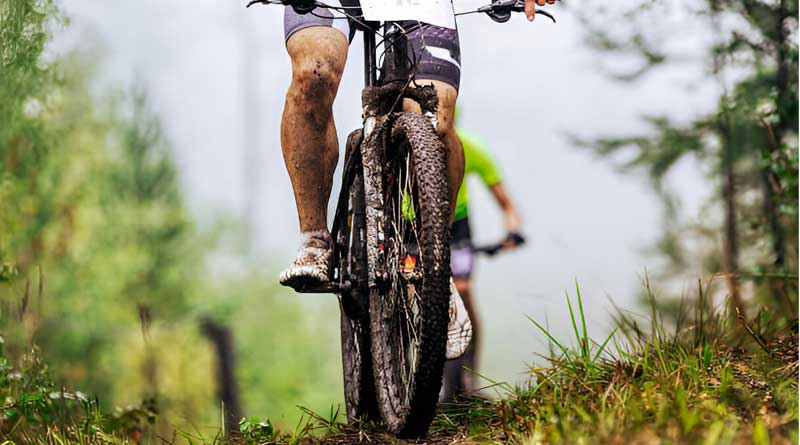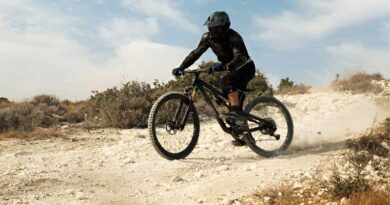Best Budget Mountain Bike Forks 2025
Looking for a good mountain bike fork without spending too much? You’re in the right place. A good fork makes a big difference. It helps with control, comfort, and handling. But high prices can scare many people away. The good news is you don’t need to break the bank. There are budget-friendly forks that work well. They may not have every fancy feature, but they get the job done. This guide shares the best budget mountain bike forks. We looked at quality, performance, and value. Whether you’re a beginner or upgrading, we’ve got picks for you. Let’s find the right fork that fits your ride and your wallet.
1. BUCKLOS Suspension Fork
- Wheel Size Compatibility: 26/27.5/29 inch
- Travel: 100mm
- Steerer: 28.6mm Threadless
- Features: Preload Adjustment
The BUCKLOS Mountain Bicycle Suspension Fork is a well-rounded, affordable upgrade for casual riders and enthusiasts. With its broad compatibility across 26, 27.5, and 29-inch wheels, it ensures riders can fit it on a wide range of mountain bikes. The 100mm travel is ideal for light to moderate trail use, offering decent shock absorption and control over rough terrain.
The standout feature is the preload adjustment, allowing users to customize the fork to their weight and riding style. The fork performs reliably under various conditions, especially for XC and light trail rides. While it’s not the lightest on the market, its solid build and responsive damping make it a budget-friendly contender for riders seeking a better ride without breaking the bank.
Pros:
- Affordable price point
- Preload adjustment for custom tuning
- Fits a wide range of wheel sizes
- Sturdy construction
Cons:
- Not ideal for aggressive trails
- Slightly heavier than premium forks
2. MEGHNA Air Suspension Fork
- Material: Aluminium Alloy
- Suspension Type: Air
- Tube: 28.6mm Threadless Straight
- Wheel Size Compatibility: 27.5/29 inch
The MEGHNA Bike Suspension Fork brings lightweight performance to riders seeking a smooth and customizable ride. Crafted from durable aluminum alloy, this fork prioritizes weight reduction without sacrificing strength. The air suspension provides a highly tunable experience, adapting well to varying rider weights and terrains.
Its straight tube design ensures a secure and responsive feel on descents and climbs. The MEGHNA fork excels on XC trails, offering excellent rebound and comfort. Though it lacks a lockout, its air system compensates with efficiency and adjustability. Ideal for mid-range riders upgrading from coil forks, this unit is a solid choice for better control and performance.
Pros:
- Lightweight aluminum construction
- Air suspension allows easy tuning
- Excellent ride comfort
- Great for XC and light trail use
Cons:
- No lockout feature
- Installation instructions could be clearer
3. ZTZ Suspension Fork (Lockout)
- Wheel Size: 26/27.5/29 inch
- Travel: 100mm
- Axle: 9mm QR
- Steerer: 28.6mm Straight Tube
The ZTZ MTB Suspension Fork offers a solid blend of performance and features, particularly appealing for budget-conscious riders. With 100mm travel and a lightweight aluminum alloy build, it delivers smooth handling over bumps and trail obstacles. The 9mm quick-release axle ensures a secure fit for standard hubs.
The crown lockout adds versatility, letting riders switch between rigid and suspension modes for climbs and flat surfaces. The fork’s shock absorption works well in XC and trail scenarios, offering decent control and reduced fatigue. It might not match premium forks in stiffness or damping, but it certainly punches above its price bracket.
Pros:
- Crown lockout for on-the-fly adjustment
- Compatible with most standard bikes
- Good value for money
- Smooth travel for XC rides
Cons:
- Limited tuning options
- Not suitable for heavy-duty trail use
4. BSFHQS Fat Bike Fork
- Travel: 190mm
- Axle: 9x135mm QR
- Steerer: 1-1/8″ Straight
- Damping: Air with Manual Lockout
The BSFHQS Suspension Fork is engineered for fat bikes, offering massive 190mm travel and robust damping to handle snow, sand, and rough trails. It’s an eye-catching upgrade with a gold finish and a beefy double crown design that boosts stability for heavier and high-impact rides.
Thanks to its air damping system and manual lockout, riders can fine-tune responsiveness based on load and terrain. It’s especially suited for electric fat bikes due to its solid structure and absorption capacity. While it adds some weight, the performance and durability justify the bulk for those venturing into rugged or extreme conditions.
Pros:
- Ideal for fat and e-bikes
- Massive travel absorbs serious shocks
- Strong double crown structure
- Lockout adds climbing efficiency
Cons:
- Heavy compared to XC forks
- Bulky for casual use
5. HIMALO Spring Fork
- Travel: 100mm
- Steerer: 1-1/8″ Straight Tube
- Brake Compatibility: Disc & V Brake
- Axle: 9mm QR
The HIMALO 26-inch Suspension Fork is a versatile, budget-conscious solution for riders who need a straightforward upgrade. With both disc and V brake compatibility, it fits a wide array of bikes. Its 100mm travel and spring-based suspension make it a decent performer on moderate trails.
The manual lockout is a handy addition for switching to a rigid ride on pavement or climbs. While not as plush or adjustable as air forks, it’s a great choice for beginners or casual mountain bikers looking for improved comfort and control. The build quality is reliable, if a bit heavier than high-end alternatives.
Pros:
- Supports both V and disc brakes
- Good price for performance
- Easy manual lockout
- Fits most 26-inch bikes
Cons:
- Spring system less adjustable
- Heavier than air forks
6. CDHPOWER Triple Tree Fork
- Compatibility: 26″/29″ Wheels
- Type: Triple Tree Suspension Fork
- Steerer: 1-1/8″
- Brake Type: Disc Only
The CDHPOWER Suspension Fork features a triple tree design, delivering stability and control for more aggressive riding or motorized builds. Designed to support both 26″ and 29″ wheels, it stands out for its rugged construction and clean black finish. The fork comes with a headset, adding value and convenience.
This fork is ideal for cruiser conversions, e-bikes, or beefier mountain builds. The suspension isn’t as refined as air or high-end coil forks, but the added rigidity and fork travel make it a capable choice for downhill or heavy commuting needs. It’s built more for strength than finesse.
Pros:
- Strong triple tree build
- Fits large wheel sizes
- Includes headset
- Excellent for motorized or heavy bikes
Cons:
- No lockout or fine-tuning
- Heavier than standard forks
7. ZTZ Rigid MTB Fork
- Type: Rigid Fork
- Material: Aluminum Alloy
- Tube: 28.6mm Threadless Straight
- Brake Compatibility: Disc Only
The ZTZ Rigid MTB Fork is designed for riders who prefer a minimal, responsive setup with no suspension. Crafted from aluminum alloy, it’s impressively lightweight and stiff, providing maximum energy transfer and precise steering. It’s perfect for XC racers or city riders who want zero maintenance and straightforward performance.
Its clean design and high compatibility with disc brakes make it suitable for modern MTB frames. While it doesn’t offer shock absorption, riders trading comfort for control will find it highly effective. It’s also a great option for converting older bikes into efficient commuters.
Pros:
- Extremely lightweight
- No suspension = no maintenance
- Responsive and precise handling
- Great for urban or race use
Cons:
- No shock absorption
- Limited to disc brake systems
How to Choose the Best Budget Mountain Bike Forks
Mountain biking is an exhilarating adventure sport that demands durability, control, and confidence in your gear—especially your bike’s suspension fork. Whether you’re a weekend trail rider or an aspiring cross-country explorer, choosing the right mountain bike fork is essential for a smoother and safer ride. However, high-end forks can often cost more than the bike itself. That’s where budget mountain bike forks come in.
This guide explores how to choose the best budget mountain bike forks, what features to prioritize, and how to ensure you’re getting value for your money without compromising performance.
1. Understand Your Riding Style
Before diving into specifications and brands, identify your riding discipline. The type of terrain you ride greatly influences the fork you need.
-
Cross-Country (XC): Light, fast rides with mild trails. Requires lighter forks with around 80–120 mm travel.
-
Trail/All-Mountain: Versatile terrain, both climbs and descents. Look for 120–150 mm travel.
-
Enduro/Downhill: Aggressive descents, technical trails. You’ll need stronger forks with 160–180+ mm travel.
Tip: If you’re new to mountain biking and do a bit of everything, a trail fork with around 120–140 mm of travel is a solid, versatile choice.
2. Know the Types of Suspension Forks
There are primarily two types of suspension forks in the budget category:
Coil Spring Forks
-
Use a metal coil to absorb shocks.
-
Pros: Affordable, simple, reliable for beginners.
-
Cons: Heavier and less adjustable than air forks.
Air Spring Forks
-
Use compressed air in a chamber to provide suspension.
-
Pros: Lightweight, easily adjustable for rider weight and style.
-
Cons: More expensive, but many budget air forks offer excellent performance.
Recommendation: If you can find a quality air fork within your budget, it offers better adjustability and weight advantages over coil forks.
3. Key Features to Consider
When evaluating budget forks, certain features make a big difference in ride quality and fork durability.
a) Travel
Measured in millimeters, travel is how much the fork can compress. As mentioned, match travel to your riding style.
-
XC: 80–120 mm
-
Trail: 120–150 mm
-
Enduro/Downhill: 160 mm and up
b) Steerer Tube Diameter and Length
Most modern mountain bikes use a 1 1/8″ straight steerer or a tapered steerer (1 1/8″ to 1.5″). Make sure the fork you choose matches your bike’s head tube.
c) Axle Type
-
Quick Release (QR): Common on older and entry-level bikes.
-
Thru-Axle: Offers better stiffness and control, common on newer models. Budget forks now often support 15 mm or even 20 mm thru-axles.
d) Wheel Size Compatibility
Check the fork’s compatibility with your bike’s wheel size—26″, 27.5″, or 29″. Using the wrong size can affect handling and safety.
e) Brake Type Compatibility
Make sure the fork is designed for the type of brakes you use:
-
Disc brakes (most common now)
-
V-brakes (rare on newer bikes)
4. Suspension Adjustments
Even budget forks now come with basic tuning features:
a) Preload Adjustment
-
Found on coil forks.
-
Adjusts spring tension to suit rider weight.
b) Air Pressure Adjustment
-
For air forks.
-
Allows precise tuning based on rider weight and style.
c) Rebound Damping
-
Controls how fast the fork returns after compression.
-
Important for keeping your wheel in contact with the ground.
d) Lockout
-
Mechanism to “lock” the suspension, useful for climbing or road riding.
Bonus: Some forks offer compression damping adjustments for more fine-tuned control.
5. Weight Considerations
Weight affects both climbing and maneuverability. Budget forks often weigh more due to less expensive materials. If you’re riding mostly cross-country or need to carry your bike, consider a lighter air fork.
Average Weights:
-
Coil Forks: 2.5 – 3.5 kg
-
Budget Air Forks: 1.8 – 2.5 kg
6. Material Quality
Cheaper forks use heavier or less durable materials. Look for:
-
Aluminum or magnesium lowers for strength and reduced weight.
-
Chromoly or steel stanchions (often heavier).
-
Anodized stanchions for improved durability and smoother travel.
7. Brand Reputation and Reviews
In the budget segment, some lesser-known brands offer surprisingly good performance. Look out for brands like:
-
SR Suntour – known for solid entry-level forks like the XCM and XCT.
-
RockShox – their XC30 and Judy forks offer excellent value.
-
RST – affordable and decent performance.
-
Bucklos – popular on Amazon, decent for light trail and XC.
-
ZTZ – low-cost alternative, but quality may vary.
Always check user reviews and YouTube ride tests to gauge real-world performance.
8. Budget Range: What to Expect
-
$50–$100: Basic coil forks, good for light riders or casual trails. Minimal adjustability.
-
$100–$200: Entry-level air forks and better coil forks. Good for XC and moderate trail use.
-
$200–$300: Mid-range options with more features—great for serious trail riding on a budget.
Spending a little more can get you significant improvements in comfort, control, and longevity.
9. Compatibility with Your Bike
Before purchasing:
-
Confirm headset compatibility (straight or tapered).
-
Ensure axle type and wheel size match.
-
Check for brake mount compatibility (Post Mount or IS).
-
Measure steerer tube length needed and cut carefully if required.
If unsure, take your bike to a local shop or consult your bike’s manufacturer specifications.
10. Where to Buy
Reliable options include:
-
Local bike shops: Great for advice, support, and installation.
-
Online retailers: Amazon, JensonUSA, Chain Reaction Cycles, and AliExpress (for Chinese brands like Bucklos or ZTZ).
-
Second-hand marketplaces: Facebook Marketplace or Pinkbike BuySell. Just ensure it’s not damaged or too worn.
Final Thoughts
Finding the best budget mountain bike fork doesn’t mean settling for poor performance. By understanding your needs and focusing on the essential features—travel, adjustability, compatibility, and materials—you can pick a fork that enhances your ride without draining your wallet.
A good fork can transform your biking experience, offering better shock absorption, improved control, and more confidence on the trails. Whether you’re upgrading an old bike or building a new one on a budget, the right fork is worth every penny.




